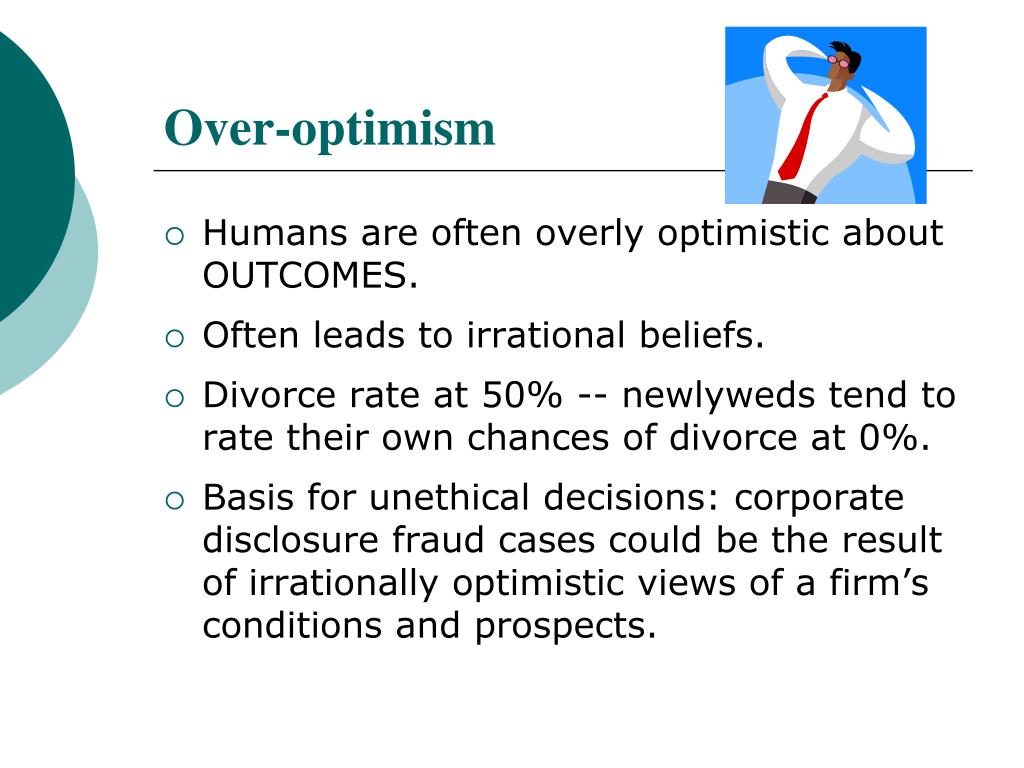

With climate change, this can allow us to feel like the consequences of environmental disaster will not affect us personally. We also tend to feel like bad things may happen to others, but not ourselves.

4 We tend to focus on things we are looking forward to rather than negative events. The optimism bias also impacts our global response to climate change. Banks continued to engage in high-risk decision making and contributed to the growing economic bubble and its ultimate crash. 3 Financial analysts and investors had unrealistic expectations of financial growth and success. Cognitive neuroscientist and optimism expert Tali Sharot posits that the optimism bias was “one of the core causes of the financial downfall in 2008”. We can see this in how optimism bias impacts financial markets. While over-optimism can negatively impact us each individually, aggregation of overoptimism on a larger level can have an exponentially devastating impact. Yet, overall it is important to be aware of how our optimism can blind us to negative outcomes and result in poor decision making. It nudges us towards focusing on the positive without becoming preoccupied with the negative. It pushes us to believe in our own abilities. Optimism encourages us to persevere, even in the face of hardship or rejection. 2 It also can stop us from taking preventative measures, like buying insurance or using contraceptives. The optimism bias can encourage risky behaviors, like smoking, by causing us to ignore the potential for unwanted outcomes. We assume that we will make more money than others. We assume our relationships will last longer than they realistically might. We assume that projects will be completed in shorter amounts of time than they actually are.
Over optimism professional#
1 However, as seen in Tom’s case, there are large costs to the optimism bias in our personal and professional lives. Research consistently supports that most of the population (estimated around 80%) exhibit an optimistic bias that arises in a variety of circumstances. Even though the past six businesses failed and environmental factors were working against him, Tom overestimated his chances for success and showed overconfidence in his abilities as an entrepreneur.

In this scenario, Tom exhibits the optimism bias. However, like the businesses before his, Tom’s restaurant is not cultivating enough business. Yet Tom still feels that with his know-how, he can circumvent these issues. A friend even tells him that the street layout and surrounding competition simply made it difficult for pedestrians to be drawn into the area.

Tom pours his time and financial resources into the venture, refusing to accept failure as an option or yield to potential shortcomings.
Over optimism full#
He was at the top of his class, full of big ideas, and understood the pulse of young city-goers. However, Tom felt as though he had what it took to make this restaurant succeed. Each venture was unable to get the necessary returns to stay afloat and were forced to close. There had previously been six failed business attempts in the building he purchased. A little bit is really beneficial, but too much can lead to some really bad economic choices.”įurther research is needed to tease out reasons why moderate and extreme optimists behave differently, the authors say.Consider the following scenario: Tom is a bright and motivated entrepreneur who is in the midst of starting his own restaurant. “Doctors tell us that one or two glasses of red wine a day can be really healthy,” Robinson said, “but no one tells you to drink the whole bottle. The researchers liken optimism to red wine. “The differences between optimists and extreme optimists are remarkable and suggest that over-optimism, like overconfidence, may in fact lead to behaviors that are unwise,” Puri said. Are less likely to pay off their credit card balances on a regular basis.Hold a higher proportion of individual stocks in their portfolios.Believe their income will grow over the next five years.Are more likely to pay their credit card balances on time.They find that compared with others, optimists: The results held across demographic, risk-taking dispositions and health-related issues. In moderation, optimism can lead to sensible decision making, but extreme optimists “display financial habits and behavior that are generally not considered prudent,” the authors write in the October issue of the Journal of Financial Economics.


 0 kommentar(er)
0 kommentar(er)
